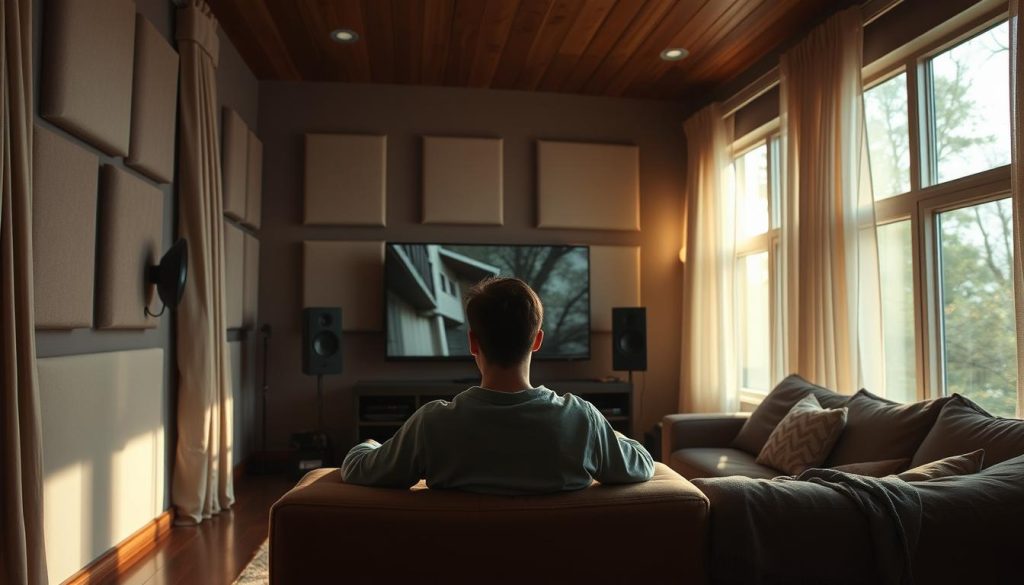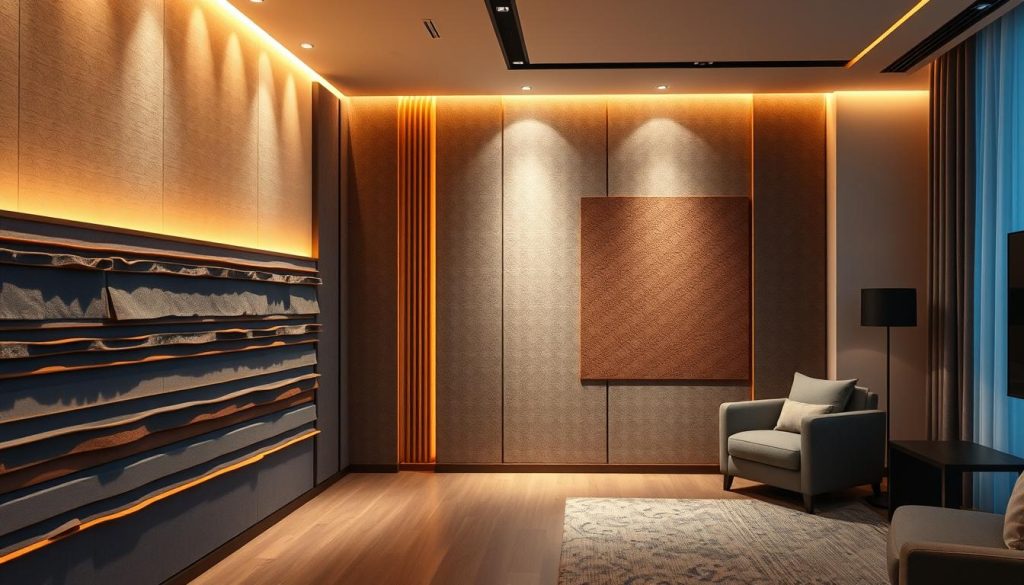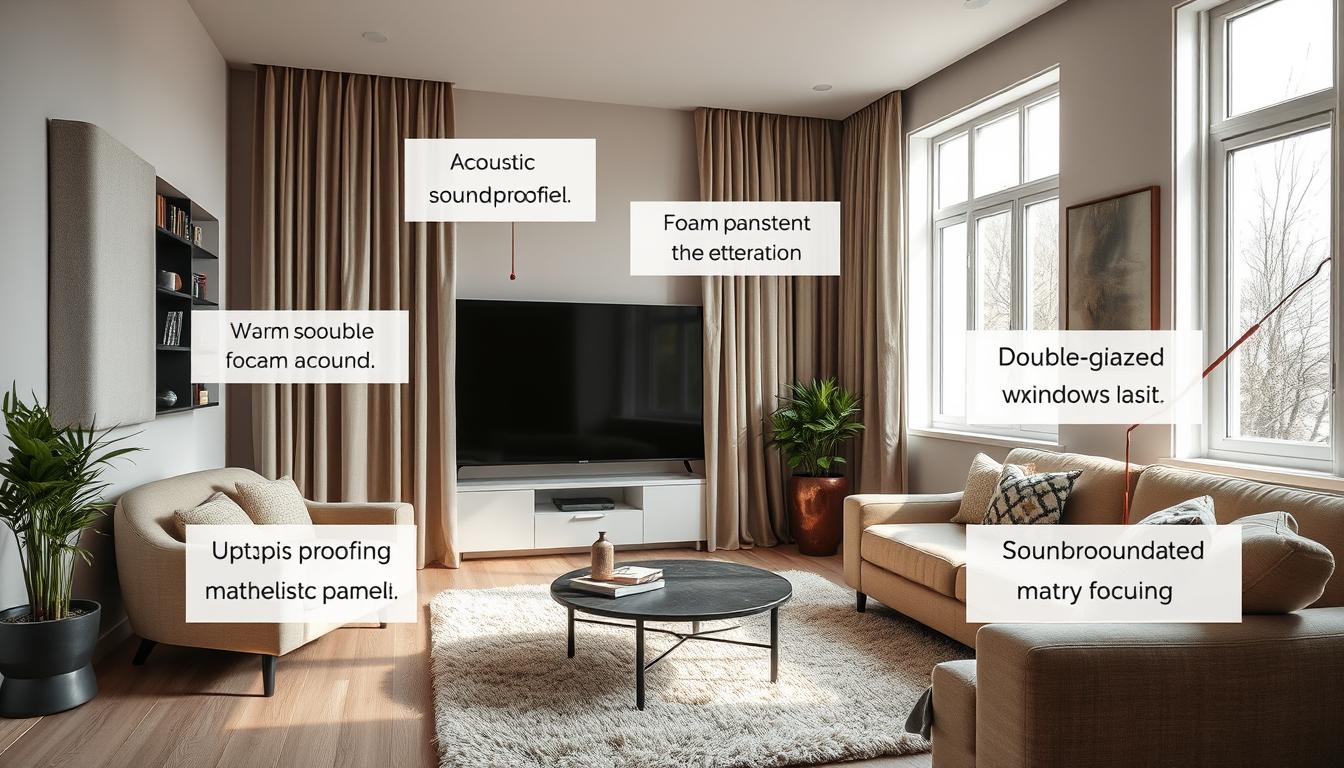As a homeowner, dealing with noise can be really frustrating. It could be from outside, noisy neighbors, or your old home’s sounds. But, there are ways to make your home quieter and more peaceful.
Older homes often don’t have enough soundproofing. This means they let in a lot of noise. But, you can fix this with the right materials and methods. I’ll talk about the problems with noise in old homes, why soundproofing is good, and how to do it yourself or with a pro.
If you want to block out outside noise, get more privacy, or just make your home quieter, I’ve got you covered. The tips I’ll give you will help you make your home a peaceful place. Let’s start and see how you can quiet down your home.
The Challenges of Noise in Older Homes
https://www.youtube.com/watch?v=yKiHxY-xjrk
Older homes were built before we had good soundproofing materials and methods. They often have thin walls, little insulation, and single-pane windows. This lets noise easily get into the house. Things like bad insulation and not thinking about sound when building make these homes noisy.
Why Are Older Homes So Loud?
Older homes are noisier for a few main reasons:
- Thin walls: Older homes used materials like lath and plaster for walls. These walls are thinner and don’t block sound well.
- Poor insulation: Older homes usually don’t have much insulation in their walls. This lets sound move easily through the house.
- Single-pane windows: Many older homes have windows with just one pane. These windows don’t block sound as well as today’s double or triple-glazed ones.
- Lack of acoustic considerations: The people building older homes didn’t think much about sound. They didn’t have the sound-dampening tools we do now.
These issues make older homes noisy. This noise can affect how good the sound is in the house and the quality of life for people living there.
Benefits of Investing in Home Soundproofing

Soundproofing your home can make it more comfortable and useful. It does more than just block out noise. It can also make your home more valuable and improve your life.
Soundproofing helps with energy efficiency. It seals gaps and improves insulation. This keeps your home at a steady temperature, making your HVAC system work less hard. This means lower energy bills and a greener home.
Also, soundproofing can make your home more valuable. Buyers like homes that are quiet and private. These homes feel peaceful and calm. So, soundproofing can make your home more attractive to buyers.
Soundproofing also makes your home more private and comfortable. It stops sounds from coming in. This means you can sleep better and feel less stressed. You’ll enjoy a better quality of life.
In summary, soundproofing is more than just about quieting noise. It also helps with energy use, home value, privacy, and well-being. It’s a smart choice for any homeowner. It makes your home better for you and your family.
soundproofing Weak Spots in Your Home

Start by finding the weak spots in your home where noise gets in. Thin walls, drafty windows and doors, and not enough insulation can let noise in. Fixing these areas can make your home quieter and more peaceful.
Thin walls let in a lot of noise. Making them soundproof can really help. Also, soundproofing windows and doors keeps out outside noise, making your home quiet.
Insulation is also key. Having enough insulation on your floor and in cavities helps soak up sound. This stops sound from moving around your home. Fixing these spots makes your home quieter and more peaceful.
Finding and fixing the main soundproofing weak spots in your home is crucial. With the right methods and materials, you can make your space quiet and free from noise. This turns your home into a peaceful place.
DIY Home Soundproofing Strategies
You don’t have to spend a lot to make your home quieter. There are easy and affordable DIY soundproofing tips that can help. These can make a big difference in how quiet your home is.
Simple Solutions for a Quieter Home
Adding sound-absorbing materials is a simple way to soundproof. Use rugs, heavy curtains, and acoustic panels. Rugs and carpeting reduce footsteps and noise. Soundproof curtains stop sound from coming through windows. Adding acoustic panels on walls absorbs sound waves.
Sealing gaps around windows and doors is another easy fix. Use weatherstripping to fill in any cracks. This helps keep noise from getting into your home.
| DIY Soundproofing Method | Benefits |
|---|---|
| Adding rugs and carpeting | Dampens footsteps and other noise |
| Installing soundproof curtains | Blocks sound transmission through windows |
| Using acoustic panels | Absorbs sound waves for a quieter environment |
| Sealing gaps with weatherstripping | Improves overall sound insulation |
With these easy DIY soundproofing tips, you can make your home quieter and more peaceful. Try these budget-friendly ideas to enjoy a more relaxing space.
Professional Soundproofing Renovations
Looking for better soundproofing? I can look into professional renovations with special techniques and materials. These might include putting in wood fiber insulation, getting new soundproof windows and doors, or swapping out drywall for acoustic types. These big projects can really help with home sound quality but cost more and might disrupt my living space during the work.
For those wanting better soundproofing, hiring pros is a smart move. They can check out my home’s sound issues and make a plan just for me. This way, I get the sound insulation and quiet I want, making my home better.
Choosing soundproofing renovations means a quieter, more peaceful home. I can enjoy my space without noise bothering me. Whether it’s reducing street sounds or making my home more private, these big changes can really improve my life.

